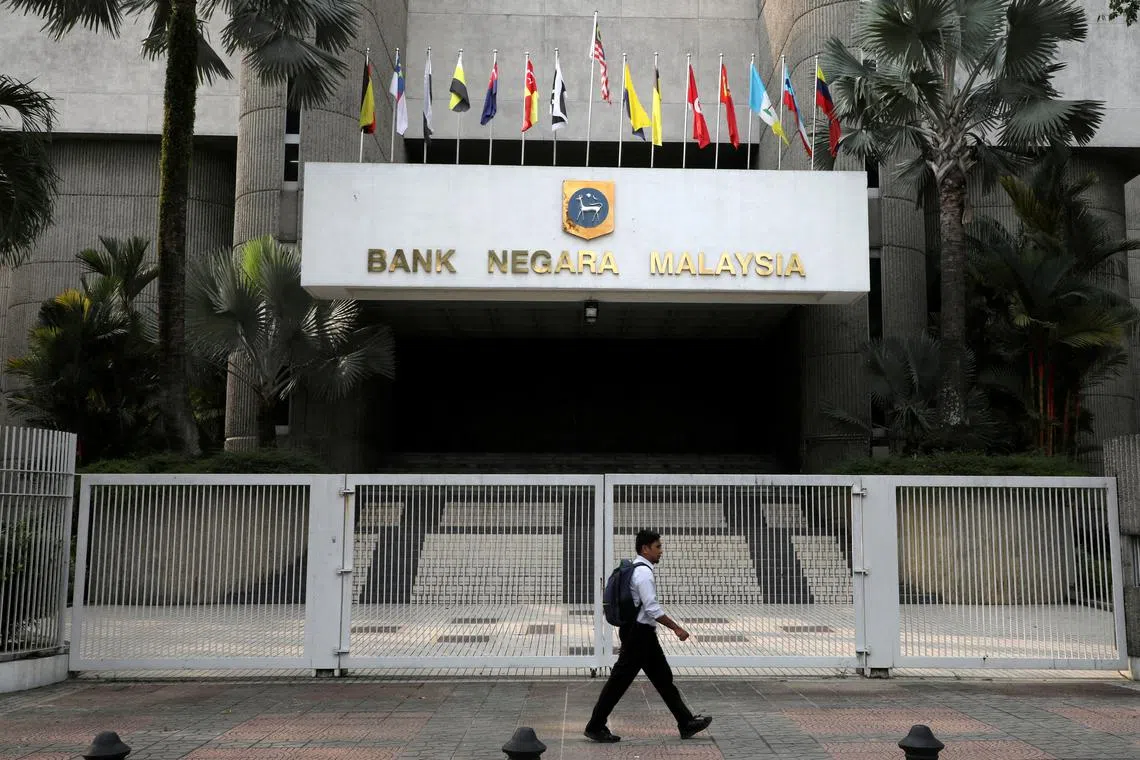Malaysia keeps key rate at 3% as expected, says economy still resilient; inflation eases
Sign up now: Get ST's newsletters delivered to your inbox

The Overnight Policy Rate has stayed at 3 per cent, close to pre-pandemic level, since a 25 basis point hike in May this year.
PHOTO: REUTERS
KUALA LUMPUR - Bank Negara maintained the key policy rate unchanged at 3 per cent on Thursday, amid rising calls for intervention to strengthen the ringgit, as the country’s economy stayed resilient and inflation continued to moderate.
The decision by the Monetary Policy Committee was widely expected by economists. In a recent Reuters poll, 28 out of 30 of them forecast that the central bank would hold the overnight policy rate (OPR); only two expected a 25 basis point increase.
In a statement on Thursday, Bank Negara said that at the current OPR level, the monetary policy stance remains supportive of the economy and is consistent with the current assessment of inflation and growth prospects.
As the central bank takes a sanguine view on future growth and inflation, economists expect Bank Negara will be on a prolonged pause on OPR throughout next year.
OCBC senior Asean economist Lavanya Venkateswaran observed that Bank Negara had maintained a “neutral” tone on its assessment of the country’s growth, and had stressed that growth would continue to be driven by domestic expenditure.
“With growth and inflation prospects expected to remain benign in 2024, we see little incentive for Bank Negara to change its monetary policy settings,” she said.
MIDF Research said the stabilisation of the core inflation rate and the challenging external environment are key factors behind the central bank’s move to keep the OPR unchanged, so that it continues to support domestic economic growth.
The OPR has stayed at 3 per cent, close to pre-pandemic level, since a 25 basis point hike in May this year.
The growing interest rate differential with the US and declining exports have affected the ringgit’s performance. The currency has, in the year to date, fallen by nearly 8 per cent to RM4.7536, weaker than at the start of this year, when it was RM4.4027 to the US dollar.
Last week, Bank Negara governor Abdul Rasheed Abdul Ghaffour and Prime Minister Anwar Ibrahim (who is also finance minister) had ruled out an interest rate hike as a means of shoring up the ringgit because the move would burden the public.
The expectations of a higher-for-longer interest rate environment in the US, and increased concerns over the escalation of geopolitical tensions have contributed to a persistently strong US dollar, said Bank Negara.
“This has affected other major and emerging market currencies, including the ringgit. Nevertheless, these developments are not expected to derail Malaysia’s growth prospects,” it added.
RHB’s economist Chin Yee Sian and associate research analyst Wong Xian Yong expect the Malaysian currency to consolidate in the first quarter of next year at around RM4.60 to RM4.70 against the greenback, as the Federal Funds Rate peaked by end-2023.
“We expect the positive carry on the US dollar to narrow against Asean currencies next year,” they said in a note on Thursday, and added that the ringgit will strengthen towards a range of RM4.50 to RM4.70 against the US dollar by the end of next year.
Bank Negara said various economic indicators show that the country’s economy is improving, with the advance gross domestic product growth estimate at 3.3 per cent, up from the 2.9 per cent expansion in the second quarter.
With the easing of cost pressures, the country’s headline and core inflation have moderated. In the third quarter of 2023, headline inflation averaged at 2 per cent, and core inflation, at 2.5 per cent.
“Going into 2024, inflation is expected to remain modest,” said Bank Negara, noting that the government’s intention to review the subsidies and price-control measures would affect the outlook for inflation and demand conditions.
On the global economy, Bank Negara said it is seeing signs of recovery, driven by strong domestic demand as labour market conditions improve.
“Global trade remains soft, partly due to the shift in spending from goods to services, and ongoing trade restrictions,” said the central bank.
Global growth remains weighed down by persistently elevated inflation due to higher commodity prices and higher interest rates, and several major economies are experiencing slowing growth momentum.
Bank Negara said the growth outlook remains subject to downside risks, mainly from higher-than-anticipated inflation, an escalation of geopolitical tension, and a sharp tightening in financial market conditions. THE BUSINESS TIMES


